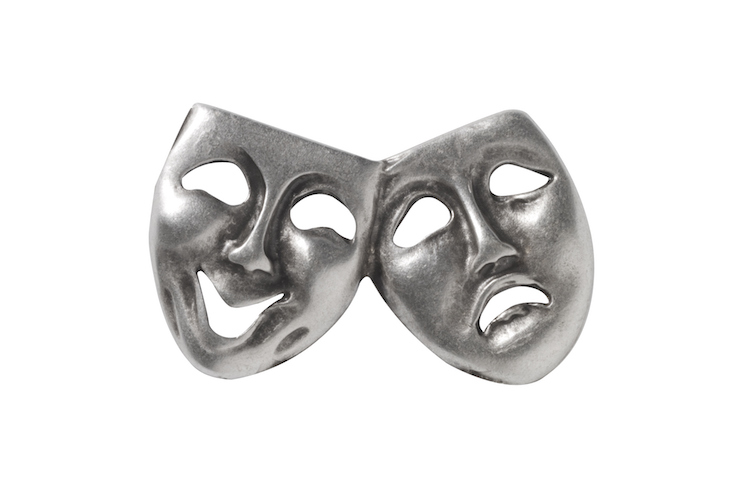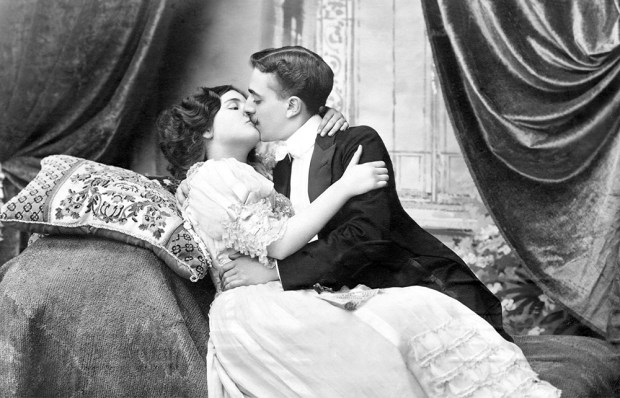I go to the theatre but rarely because I am overpowered by even mediocre acting and find it exhausting. Theatre has the same effect on me, I imagine, as the Great Exhibition must have had on a Dorset peasant with a cheap-day return on the newly opened Great Western Railway. But by what strange magic does an actor transcend his or her everyday persona and convincingly dissemble an altogether different, fictional one? Is it the training? Or a gene — Romany, perhaps? Or are actors afflicted by a peculiar personality disorder in which part of the brain is either overdeveloped or missing?
For a newspaper article, I once rehearsed with a theatre company for a week. I was Second Jailer for the opening night of Puss in Boots. The cast were professional actors glad to have work and they called each other darling. A veteran Shakespearean actor was our pantomime dame, a role that demanded only a slightly toned-down version of his real self. The cast warmly welcomed me into the family. Between ten in the morning and midnight we were either rehearsing or crowded around the same two round tables in the boozer.
At times these actors seemed frankly cynical and artificial, at others kind and sincere. Sometimes they were all of these things at once. When I left and said goodbye to the careworn director, he burst into tears. But none of them would give a straight answer when I asked why they did it or what it was that made an actor convince. When I suggested that an actor’s strange power must surely be the result of a pact with the Devil, they said I wasn’t far out.
Last week, I went to see a production of R.C. Sherriff’s Journey’s End, staged in a 150-seat theatre by Dartington Playgoers, which is an amateur company. I hadn’t braved the theatre for about five years. The Dartington estate in Devon is an arts and crafts village founded in 1925 by the philanthropists Dorothy and Leonard Elmhirst. They were among the first to read Sherriff’s script, detected a pacifist theme hitherto unknown to the author, and backed Journey’s End financially. The play’s popular success is said to have altered the British public’s perception of the war, which is a classic example of how easily an idealistic, wealthy, well-connected coterie can put fantastic ideas into our heads.
The Elmhirsts’ proto-hippie spirit lives on among the mindful, serene, well-off Narnians who cling still to the area. I went on the opening night and the auditorium was packed with them. Watching them wriggling out of their yak cardigans and chattering gaily, I wondered. Pacifist or not, Journey’s End was very far from being their cup of camomile. But perhaps, after 50 or 60 years as flag bearers in the vanguard of the cultural revolution, their advanced minds were open now to absolutely anything, evena play about chaps. And chaps, moreover, waving pistols about.
Down went the lights. An officers’ dug-out on the western front in 1918 was revealed. An amateur actor wearing a first world war officer’s uniform was drying a sock over a candle flame and singing a slightly risqué ditty to himself. The character was called Hardy. Yes, I was deeply impressed by this actor’s bottle in getting up on stage in the first place. But no, sorry. No enchantment. No change. I saw only an amateur actor and some extempore slapstick. But never mind! We tried! And fortunately Hardy quickly exits never to reappear.
Entering next was a kindly, elderly officer called Osborne. To his brother officers, Osborne is known as ‘Uncle’. This actor was short and fat and he could act. He had the gift, or had made the Satanic pact, or was suffering from a personality disorder; or whatever it is that makes an actor convince. Then we saw that he was not just a good actor but a very wonderful actor. He had that stillness. I believed in him and I loved him and when he was selected for the suicidal raid across no-man’s-land, I was as quietly devastated as he was.
Now we were farming!
Enter Raleigh. Raleigh is the new young subaltern. This actor was a beanpole. He had it too. He had it so compellingly that I laughed out loud with naive amazement. Enter Stanhope, the lead — another beanpole. He convinced as well. And so did Trotter. Glancing round, I could see that the Narnians were leaning forward in their rows in the darkness, spellbound and rooting passionately for these poor soldiers of the King. Amazing. But what on earth is it that they have, these actor-shamen, which other actors have not? The exercise of it, even on numbskulls, must be very satisfying.
Got something to add? Join the discussion and comment below.
Get 10 issues for just $10
Subscribe to The Spectator Australia today for the next 10 magazine issues, plus full online access, for just $10.
You might disagree with half of it, but you’ll enjoy reading all of it. Try your first month for free, then just $2 a week for the remainder of your first year.















Comments
Don't miss out
Join the conversation with other Spectator Australia readers. Subscribe to leave a comment.
SUBSCRIBEAlready a subscriber? Log in